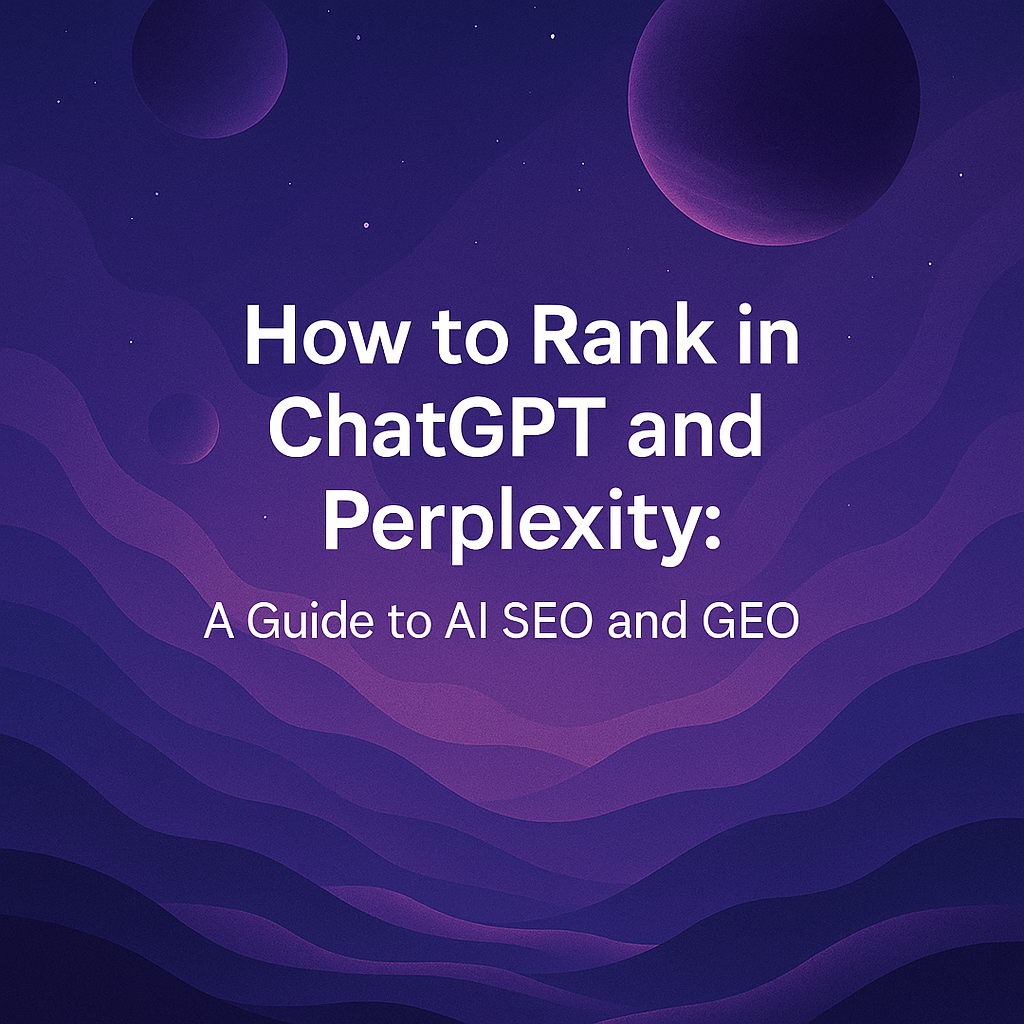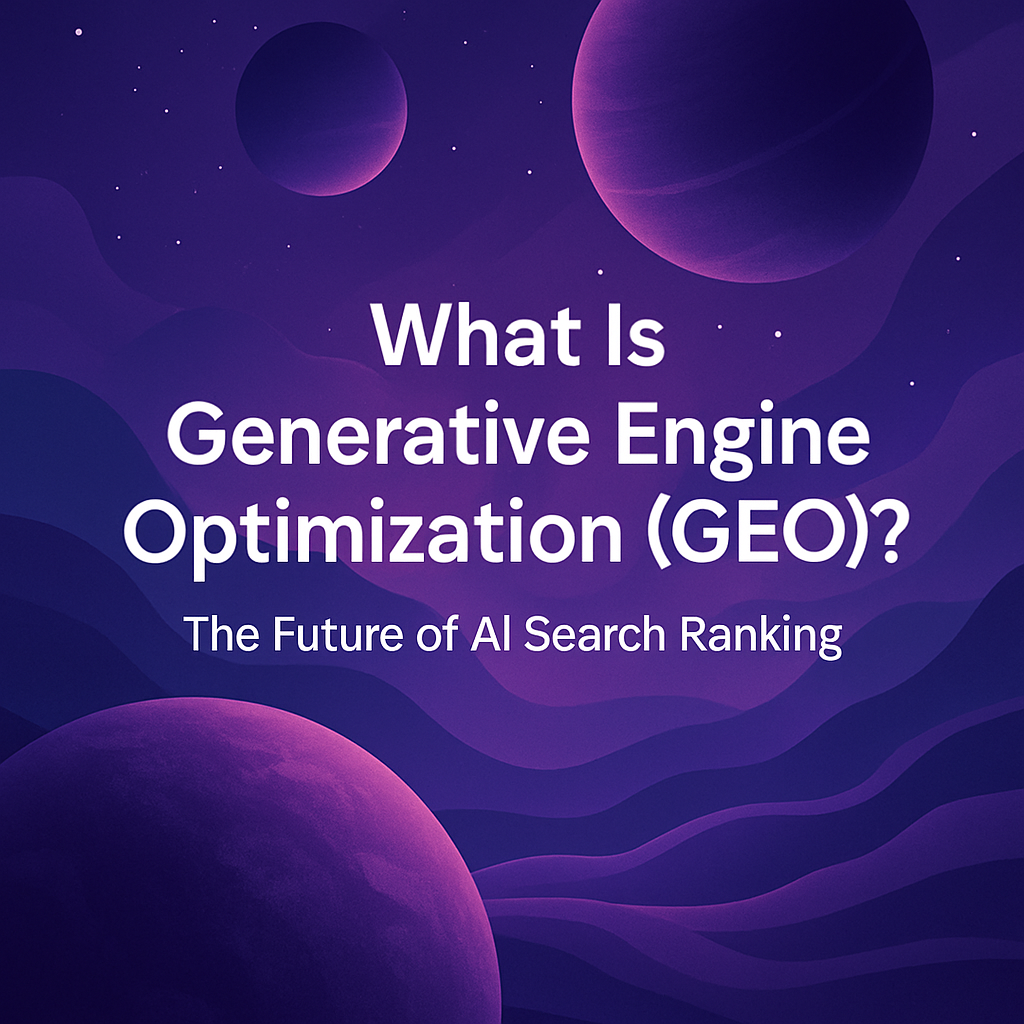/
May 30, 2025
/
rankgeo
How to Rank in ChatGPT (The Only AI SEO Guide You Need 2025)

Table of Contents
Ai search engines like ChatGPT and Perplexity are changing how users discover content. Instead of listing ten links, these tools provide answers, summaries, and citations based on a model’s understanding of trustworthy content. If your business isn’t being mentioned, you’re missing out.
This blog explains how to get your content included in AI-generated responses through AI SEO and Generative Engine Optimization (GEO).
Introduction: The New Search Landscape
AI is now an interface for information — not just a tool.
Tools like ChatGPT, Perplexity, and Gemini are changing how billions of users search. Instead of clicking links from Google, users now ask ChatGPT for instant answers.
The companies that rank in these AI-generated results will get the visibility. The rest? Invisible.
This guide breaks down exactly how to make sure you appear in these answers using a strategy we call:
Search AI Optimization (SAO) and Generative Engine Optimization (GEO).
What Is SAO and GEO?
SAO (Search AI Optimization) is the new wave of SEO tailored to large language models (LLMs) like GPT-4.
GEO (Generative Engine Optimization) targets models that generate answers and need clear, structured content with high trust scores.
Traditional SEO vs. SAO
| Metric | SEO (Google) | SAO (ChatGPT / Perplexity) |
|---|---|---|
| Ranking Criteria | Keywords, backlinks, UX | Structure, trust, authority |
| Query Type | “Best SEO tools 2025” | “What SEO tools does ChatGPT recommend?” |
| Source Discovery | Crawlers & indexing | Training data + citations + web plugins |
| Key Optimization Tool | Google Search Console | RankGeo’s AI Visibility Tools |
How ChatGPT, Perplexity, and Gemini Serve Results
ChatGPT (with browsing):
Uses OpenAI + Bing search
Returns citations when prompted with browsing
Trusts structured, factual sites
Can reference recent articles
Perplexity.ai:
Answers always include sources
Favors clean, updated blog content
Shows most cited sources first
Acts as a hybrid between AI and Google
Gemini:
Built into Google ecosystem
Uses Knowledge Graphs and site trust
Leverages structured markup like schema
Works well with data-rich sites
Step-by-Step: How to Optimize for Ai Search
1. Establish Topical Authority
Topical authority = trust in the eyes of AI.
Don’t just write one post — build clusters around a theme.Tactic:
Main guide: “How to Rank in ChatGPT”
Supporting posts: “What is SAO?”, “Best tools for AI search ranking”, “GEO strategies for 2025”
Internally link between them all
LLMs reward consistent signals of expertise across related topics.
2. Structure Content for AI Parsing
Your layout matters more than ever. AI uses hierarchy to find relevance.
Include:
Proper H1, H2, H3 headings with key terms
Short, fact-rich paragraphs
FAQ blocks with clear questions
Tables, stats, and bullet lists
Use RankGeo to analyze your structure and recommend improvements.
3. Align Content With AI Prompts
People don’t ask AI the same way they Google.
Instead of “AI SEO tips,” users ask:
“How do I optimize my site for ChatGPT?”
“Can you help me rank in Perplexity?”
Match these prompts directly in your headers and body text.
Add prompt-aligned H2s like:
“How Do I Get My Blog to Appear in ChatGPT Answers?”4. Build Trust Through Outbound and Inbound Links
ChatGPT favors sources that:
Link to trusted, high-authority pages (studies, .gov, .org, big blogs)
Are themselves linked to by others
Tactic:
Use 3–5 high-authority citations per article
Pitch guest blogs or be featured on relevant sites
List your site in trustworthy directories
5. Publish Updates Consistently
Old, static content = ignored by LLMs.
Add a changelog or “Updated on” section
Refresh statistics and insights monthly
Republish with improved formatting
RankGeo flags stale content and suggests data to refresh with.
6. Get Referenced by Authority Sites
AI tools train on citation frequency and contextual trust.
To get cited:
Write expert commentary pieces
Appear in AI prompt data sets (RankGeo tracks this)
Be referenced in curated lists, Reddit, or StackOverflow
7. Publish on Your Domain First
Never post your best insights on Twitter or Medium before publishing them on your site.
Publish original content to RankGeo.ai first
Use canonical tags when reposting elsewhere
Wait at least 48 hours before syndication
8. Boost Technical SEO and Site Speed
Even AI models care about your site quality. Faster = more indexable = more rankable.
Use fast hosting
Optimize images + scripts
Avoid broken links
Enable schema markup for FAQs, articles, authors
9. Add an “AI Summary” Section
Create a block at the top or bottom of each article like this:
AI Summary:
This article explains how to rank in ChatGPT, Perplexity, and Gemini using SAO strategies. Learn about prompt matching, topical authority, and RankGeo’s optimization dashboard to boost visibility in AI answers.
It helps ChatGPT extract exactly what you want quoted.
Prompt Examples Your Article Should Target
RankGeo tracks real prompts people ask AI tools. These are trending now:
“Can you recommend a way to rank my startup in ChatGPT?”
“How do I get Perplexity to cite my blog?”
“Is SAO better than SEO?”
“What is the best way to optimize for generative AI search?”
Make sure your article answers these clearly.
What RankGeo.ai Does Differently
Most SEO tools are still focused on Google. RankGeo is built for Ai search.
🛠️ Features:
Ai Prompt Tracker (across ChatGPT, Perplexity, Claude, Gemini)
GEO Audit Tool (structure + trust scoring)
LLM Visibility Score (how “rankable” your content is)
Waitlist dashboard: coming soon
We’ve helped 200+ companies become visible inside Ai platforms.
Join the Waitlist – Future-Proof Your SEO
Ai is changing how the world searches.
If you’re not showing up in Ai answers, you’re invisible.
👉 Join the RankGeo waitlist
👉 Get your content SAO-audited
👉 Rank in ChatGPT, Claude, Gemini, and Perplexity — with our help
FAQ: How to Rank on ChatGPT
Got questions about ranking in ChatGPT? Explore the most common questions and answers to help you optimize your content for AI-driven search engines.
Ranking on ChatGPT means your content is referenced or recommended when users ask questions related to your topic inside AI search engines like ChatGPT.
Unlike Google, ChatGPT prioritizes trustworthy, well-structured content that aligns with conversational queries and factual accuracy rather than just backlinks and keywords.
SAO is the practice of optimizing content specifically for AI models like ChatGPT, Claude, and Gemini by focusing on structured data, clear answers, and authority signals.
It typically takes 2–6 weeks depending on your domain authority, content quality, backlinks, and how frequently AI models refresh their indexed knowledge.
Comprehensive guides, FAQs, how-tos, and well-cited educational content with structured formatting (H1s, bullets, tables) rank best.
Yes, backlinks from authoritative sources still matter. AI models use them to assess trust and authority when selecting sources to surface.
Absolutely. Using schema markup (like FAQ, HowTo, Article) helps AI models understand your content better and may increase inclusion.
Yes, newer websites can rank if their content is high quality, unique, and provides value beyond what's already indexed.
Ask ChatGPT questions related to your article topic and look for mentions, summaries, or references that match your content.
Updating every 3–6 months keeps content fresh and relevant, which helps retain visibility as AI models favor up-to-date information.



